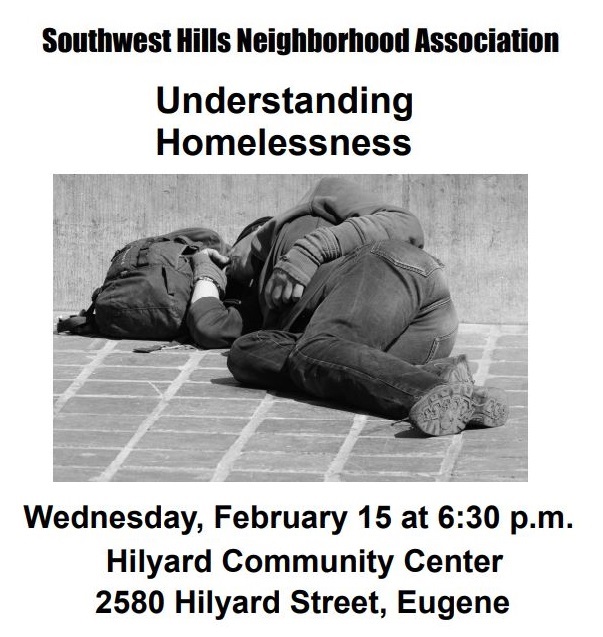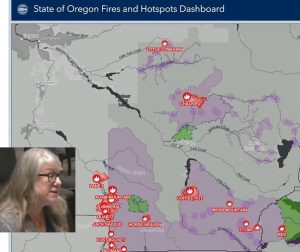Neighborhood panel looks at next steps on homelessness
7 min read
Here’s the Southwest Hills panel discussion, Understanding Homelessness, in 10 minutes. On Feb. 15, neighborhood association Chair Chris Jockheck.
[00:00:09] Chris Jockheck (Southwest Hills Neighborhood Association chair): My name is Chris Jockheck. I’m the chair of SHiNA, Southwest Hills Neighborhood Association. A little bit about my background is: I’ve been here for two and a half years. I came from Wisconsin. We didn’t see the tents. So for me, it’s been pretty shocking, and if I had questions, a lot of new people have questions as well.
[00:00:30] John Q: A comment from Jim.
[00:00:31] Jim: It’s my understanding that, since about 1980, there’s been a big reduction in mental health facilities in Oregon State.
[00:00:41] Kelly McIver (City of Eugene): And then at the same time, the numbers of people experiencing mental health issues have gone up dramatically. And the need and sort of the impact on our communities has become more severe.
[00:00:51] John Q: Kelly McIver’s presentation, as summarized by Todd Boyle:
[00:00:55] Todd Boyle (Amazon neighborhood): There’s three things. We need tens of millions of dollars for programs from the state (which we cannot pay for in Eugene), for addiction services, like recovery programs and for mental illness. And we’re waiting for legislature, as you pointed out.
[00:01:12] And secondly, we need more well-run Conestoga camps, rest stops. They can be sheds and stuff, but we need about maybe 1,000 of these places for people to be able to get out of their desperation of literally living in tents and cars and get on their feet again, of which the (Nightingale Hosted Shelters) 34th and Hilyard camp has graduated—more than 300 people have gone through there—and have gone out mostly into housing and they got back on their feet. This is a system that works.
[00:01:44] And thirdly, of course, we need to have police for the people who are misbehaving.
[00:01:49] John Q: The panel was asked whether there is a common reason why people become homeless the first time.
[00:01:55] Heather Sielicki (Panelist, Southeast Neighbors): Currently about a third of the people who are experiencing homelessness in Eugene have one or more disabling conditions. So medical debt and health is a pretty large concern. And then there’s also addiction, which many consider a health issue.
[00:02:13] We had money coming in for COVID. We didn’t have enough providers to be able to spend the money that was available. Largely we’ve been using volunteer labor through the church system for sheltering people during inclement weather for almost 15 years—a solution that was supposed to last just one season.
[00:02:39] So it’s not just money, right? It’s also having the staff and the facilities and the organizations and the training and all of those things. And then having a functioning, coordinated public safety system.
[00:02:55] It’s all of the different systems that are failing people and creating records amounts of homelessness at a time when we also see earthquakes and wildfires and other things that are actually making more people lose their housing than ever before.
[00:03:16] John Q: Tracy from Southeast Neighbors was asked to share observations about the root causes of homelessness.
[00:03:21] Tracy (Panelist, Southeast Neighbors): I’m Tracy. I’m a co-manager of Nightingale Hosted Shelters at 34th and Hilyard, across from Dari Mart. So root causes are poverty from childhood; root causes are people getting kicked to the curb one too many times. You can have a job and be all set up and they can say ‘Kick rocks,’ which is very unsettling when your whole life depends on keeping that job. So, many people have given up.
[00:03:51] I will never say anything disparaging about people who live unsheltered / unhoused, because everybody is somebody’s mother, son, daughter. Like, I remember being in a march once and a veteran who I’d seen around town said, I was told, ‘If you work hard every single day of your life, then you’re going to be okay.’ Well, that’s what’s gone away.
[00:04:18] Many people fall through the cracks. Even in the military, people just get kicked to the curb. Like a veteran who has an alcohol problem. The military doesn’t really take the time to deal with that person. They dishonorably discharge them. So there’s a law that was passed a couple years ago, even if you’re dishonorably discharged, you can access benefits. So that was huge.
[00:04:43] Losing a child, losing your family. A man who used to hang out, right (in) South Eugene by Allann Brothers (Coffee) when it was still there— Walt—he passed away. His wife and kids got brutally killed when they got hit by a car. A drunk driver. Many, many people out here have family who’s been hit by drunk driver, like— Trauma, that’s the word we use.
[00:05:07] They just live and they’re really good people but what are they going to do? Go buy their house and keep their house up when everything they had was lost. What if you have a child pass away? What if your parents were meth addicts and you got addicted at a young age?
[00:05:23] When you get out of prison, you have a felony on your record. There’s people that hire felons, but you can’t get Section 8—you can’t get subsidized housing. When you don’t pay your child support, you lose your license; when you lose your license, how are you supposed to get work?
[00:05:40] We need to build people up… Compassion is really the first place to start.
[00:05:46] John Q: A member of the audience spoke of feeling stigmatized by a local housing agency. The agency performed no compatibility matching, as commonly done for college students. Agency employees told homeless persons they were ‘job security.’
[00:06:02] Heather Sielicki (Panelist, Southeast Neighbors): In most of our systems, well, we have an ombudsman that people can go to, to talk about a standard of care. We don’t have that at all.
[00:06:12] It’s actually even legal and lawful in Eugene to say, ‘I see you’ve been homeless. I don’t rent to homeless people.’ Because there’s no law against it. So you’re right, the stigma against having been homeless, the stigma against having had mental illness, addiction, is a huge reason why we haven’t been able to establish the number of facilities that are needed, fund the programs that are needed, and retain the staffing. It’s all interconnected.
[00:06:47] Tracy (Panelist, Southeast Neighbors): Every neighborhood needs a rest stop. Every rest stop needs a neighborhood. There’s a man who hangs out at Dari Mart—a housed man—who reads the paper and smokes cigarettes. And he said: ‘What rest stops did for our neighborhood is take away the fear because we’re just people.’
[00:07:08] When people come into Nightingale, they can experience community and when you’re in a community and you have a stove to go cook on and you go make breakfast, it’s like you keep normalizing things and you have a place to keep your things safe, which to me is the hugest thing, realizing you’re safe.
[00:07:28] And then about a third of our residents have case workers, which is just huge because a rest stop provides a place for case workers to find people. ‘Cause now more people have phones, but how are you going to charge a phone anyway?
[00:07:45] So then we say, ‘What do you want to do for work?’ We’re working on our job development.
[00:08:01] John Q: Asked about low-barrier shelters, the City’s Kelly McIver.
[00:08:04] Kelly McIver (City of Eugene): We would love to have shelters where we could fully accommodate pets and partners and have ample storage for possessions.
[00:08:16] Clay: My name’s Clay. I’m an architect. I recently visited the newest safe sleep site, looking at how we can design those to be more permanent installations. How can we kind of blow up the system and think about creating housing faster and more affordably for more people?
[00:08:25] Heather Sielicki (Panelist, Southeast Neighbors): Common buildings and then smaller buildings— more village-style communities. More single-room occupancy, but updated. We have an aging population. We need more senior-friendly and multi-generational housing, more community land trusts, all of those things.
[00:08:43] Incentives for people who have more house than they need to divide that, to go with a duplex and triplex when possible.
[00:08:51] I’m hoping to see more long-range thinking (from the City of Eugene) involving the Planning Department. They’ve just been focusing on crisis response and if we’re going to be getting a lot of money from the state from the declaration of emergency, I hope we can leverage that with opening up land use to make more housing possible. ‘Cause if we’re going to build 36,000 houses a year, where are we going to put them?
[00:09:17] John Q: A comment from Norman.
[00:09:19] Norman: In ‘81, ’82…there actually was a map… The land is still there. At the cloverleafs, you’ll see some motor homes and some trailer courts being built… I applaud Terry McDonald for trying to develop some of these trailer house cities. I think that’s the fastest way to get people into some places of their own where they can invest.
[00:09:35] John Q: Chair Chris Jockheck thanked event organizers.
[00:09:39] Chris Jockheck (Southwest Hills Neighborhood Association chair): Small group with a lot of energy: Ralph McDonald, Fred Mallory, Rita Fiedler, Clay Neal, and Bev McDonald.
[00:09:48] John Q: Every neighborhood needs a rest stop, and every rest stop needs a neighborhood. Get involved through the city website.



